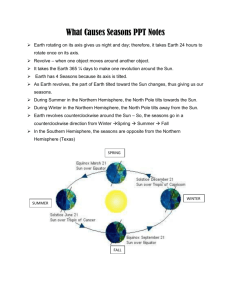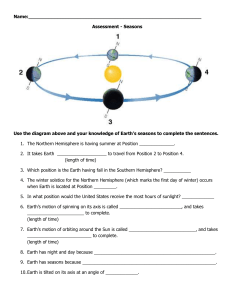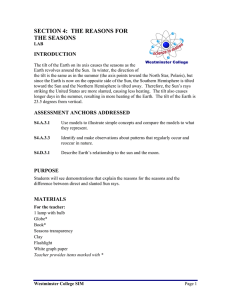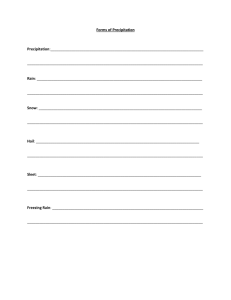Study Buddy Seasons
advertisement
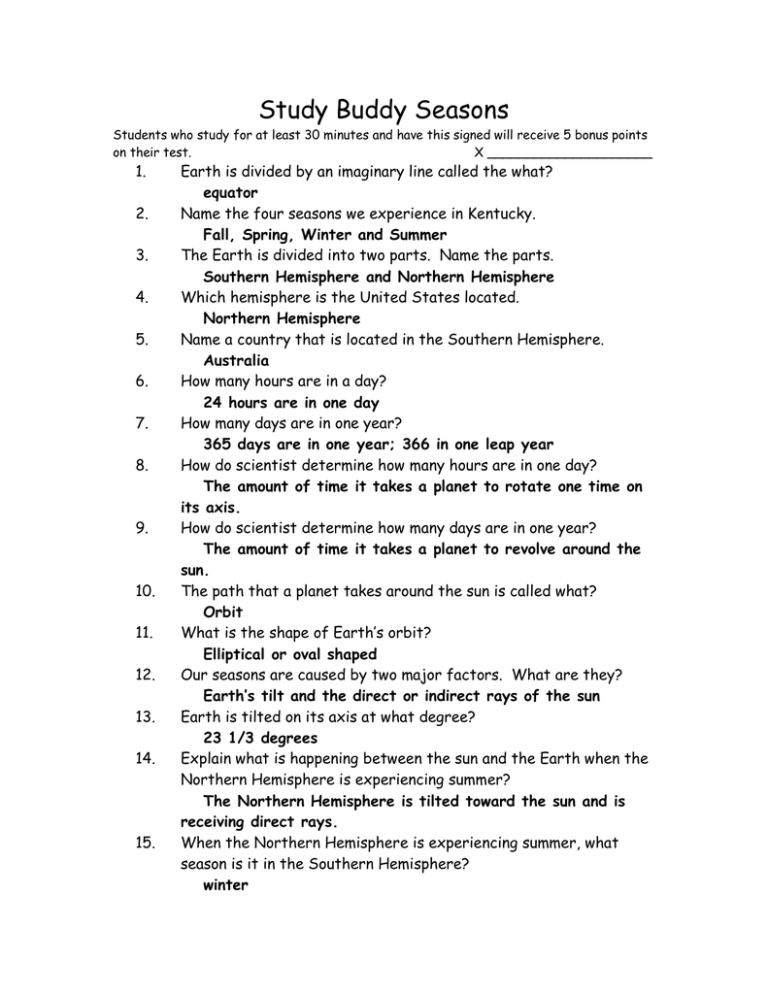
Study Buddy Seasons Students who study for at least 30 minutes and have this signed will receive 5 bonus points on their test. X _____________________ 1. 2. 3. 4. 5. 6. 7. 8. 9. 10. 11. 12. 13. 14. 15. Earth is divided by an imaginary line called the what? equator Name the four seasons we experience in Kentucky. Fall, Spring, Winter and Summer The Earth is divided into two parts. Name the parts. Southern Hemisphere and Northern Hemisphere Which hemisphere is the United States located. Northern Hemisphere Name a country that is located in the Southern Hemisphere. Australia How many hours are in a day? 24 hours are in one day How many days are in one year? 365 days are in one year; 366 in one leap year How do scientist determine how many hours are in one day? The amount of time it takes a planet to rotate one time on its axis. How do scientist determine how many days are in one year? The amount of time it takes a planet to revolve around the sun. The path that a planet takes around the sun is called what? Orbit What is the shape of Earth’s orbit? Elliptical or oval shaped Our seasons are caused by two major factors. What are they? Earth’s tilt and the direct or indirect rays of the sun Earth is tilted on its axis at what degree? 23 1/3 degrees Explain what is happening between the sun and the Earth when the Northern Hemisphere is experiencing summer? The Northern Hemisphere is tilted toward the sun and is receiving direct rays. When the Northern Hemisphere is experiencing summer, what season is it in the Southern Hemisphere? winter 16. Draw a picture of the Earth and the sun if it is summer time in the Southern Hemisphere. 17. If an object has a large amount of mass, what will happen to its weight and gravity? It will increase. Why is it always warmer at the equator? The equator always receives direct sun rays no matter which direction the Earth is tilted. Definitions: Mass-the amount of “stuff” that is inside something Weight-how we measure the gravitational pull on an object Matter-any solid, liquid or gas that occupies space and has mass Gravity-the force that pulls down on an object Rotation-the amount of time it takes a planet to spin one time on its axis Revolution-the amount of time it takes a planet to revolve one time around the sun Axis-the imaginary pole that runs through the North and South pole Earth’s distance from the sun has nothing to do with changing seasons. The 23 1/3 degree tilt of Earth on its axis and the kind of rays received in a hemisphere determines the seasons. For example, the Earth is actually 3 million miles farther away from the sun in the summer time than in the winter time. In space 3 million miles is no big deal! Even though the Earth is farther away from the sun, it will be warmer because the Northern Hemisphere is tilted toward the sun and is receiving direct sun rays. 18. 19. 20.
